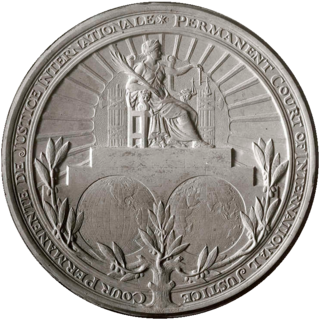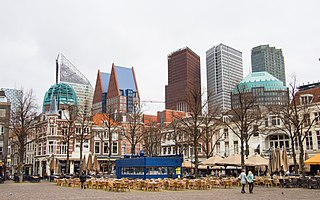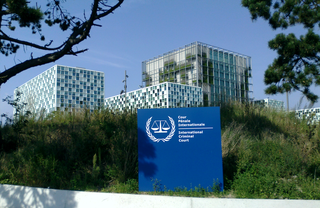
The International Criminal Court is an intergovernmental organization and international tribunal seated in The Hague, Netherlands. It is the first and only permanent international court with jurisdiction to prosecute individuals for the international crimes of genocide, crimes against humanity, war crimes and the crime of aggression. The ICC is distinct from the International Court of Justice, an organ of the United Nations that hears disputes between states.

The International Court of Justice, or colloquially the World Court, is the only international court that adjudicates general disputes between nations, and gives advisory opinions on international legal issues. It is one of the six organs of the United Nations (UN), and is located in The Hague, Netherlands.

The International Criminal Tribunal for the former Yugoslavia (ICTY) was a body of the United Nations that was established to prosecute the war crimes that had been committed during the Yugoslav Wars and to try their perpetrators. The tribunal was an ad hoc court located in The Hague, Netherlands.

The Permanent Court of International Justice, often called the World Court, existed from 1922 to 1946. It was an international court attached to the League of Nations. Created in 1920, the Court was initially well-received from states and academics alike, with many cases submitted to it for its first decade of operation.

The Hague is the capital city of the South Holland province of the Netherlands. With a population of over half a million, it is the third-largest city in the Netherlands. Situated on the west coast facing the North Sea, The Hague is the country's administrative centre and its seat of government, and while the official capital of the Netherlands is Amsterdam, The Hague has been described as the country's de facto capital since the time of the Dutch Republic.

The Permanent Court of Arbitration (PCA) is a non-UN intergovernmental organization headquartered at the Peace Palace, in The Hague, Netherlands. Unlike a judicial court in the traditional sense, the PCA provides administrative support in international arbitrations involving various combinations of States, State entities, international organizations and private parties. The cases span a range of legal issues involving territorial and maritime boundaries, sovereignty, human rights, international investment, and international and regional trade. The PCA is constituted through two separate multilateral conventions with a combined membership of 122 Contracting Parties. The PCA is not a United Nations agency, but has been a United Nations observer since 1993.
Wimbledon most often refers to:

The Rome Statute of the International Criminal Court is the treaty that established the International Criminal Court (ICC). It was adopted at a diplomatic conference in Rome, Italy on 17 July 1998 and it entered into force on 1 July 2002. As of February 2024, 124 states are party to the statute. Among other things, it establishes court function, jurisdiction and structure.

International courts are formed by treaties between nations, or by an international organization such as the United Nations – and include ad hoc tribunals and permanent institutions but exclude any courts arising purely under national authority.

The Peace Palace is an international law administrative building in The Hague, the Netherlands. It houses the International Court of Justice, the Permanent Court of Arbitration (PCA), The Hague Academy of International Law and the Peace Palace Library.
Hague Tribunal is a popular name for any of the various international courts located in The Hague, Netherlands:

Antonio Sánchez de Bustamante y Sirven was a Cuban lawyer, educator, politician and international jurist. He promoted the existence of a common American regulation for private international law. For this reason, the sixth Pan-American Congress took place in Cuba in 1928, in the final document, the Treaty of Havana is attached in the annex of the Code of Private International Law.

The Hague Academy of International Law is a center for high-level education in both public and private international law housed in the Peace Palace in The Hague, Netherlands. Courses are taught in English and French and, except for External Programme Courses, are held in the Peace Palace.
The Hague Justice Portal is a website that promotes, and provides greater access to, the institutions, courts and organisations in The Hague, The Netherlands, working in the field of international peace, justice, and security. The Portal was officially launched by Her Royal Highness Princess Margriet of the Netherlands in The Hague on 6 April 2006.

Prince Sri Nagendra Singh was an Indian lawyer and administrator who served as President of the International Court of Justice from 1985 to 1988. He was one of the four judges from India to have been Judges of the International Court of Justice in The Hague, the others being B. N. Rau (1952–1953) First Indian Judge at ICJ, R. S. Pathak (1989–1991) the 18th Chief Justice of India, and Dalveer Bhandari (2012–), former Justice of the Supreme Court of India.

José Gustavo Guerrero was a Salvadoran diplomat and jurist. He was President of the Assembly of the League of Nations from 1929 to 1930. He served as the last president of the Permanent Court of International Justice from 1937 to 1946; he was also the first president of the International Court of Justice from 1946 to 1949, and remained on the Court as a regular judge until his death in 1958.

Mineichirō Adachi was a Japanese legal expert and President of the Permanent Court of International Justice at the Hague from 1931 until 1934.

Harukazu Nagaoka was a Japanese diplomat and jurist who served as member of the Japanese delegation to the Commission of Responsibilities at the Paris Peace Conference and represented Japan to the League of Nations. He also sat on a number of national and international judicial and arbitral positions, including as a judge on the Permanent Court of International Justice.
Åke Wilhelm Hjalmar Hammarskjöld was a Swedish lawyer and diplomat. He was the first Registrar of the Permanent Court of International Justice, serving from 1922 to 1936, when he was elected to the position of judge to the same court. He served in the latter position until his death.
The 2022 International Court of Justice election was held on 4 November 2022 at the United Nations Headquarters in New York City. The General Assembly and the Security Council concurrently elected Leonardo Nemer Caldeira Brant for remainder of the nine-year term of office that had been held by Judge Antônio Cançado Trindade, who died in May, 2022.













